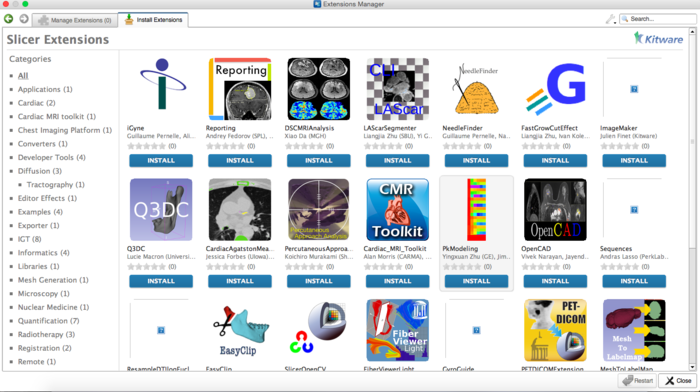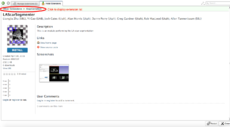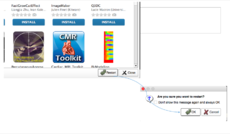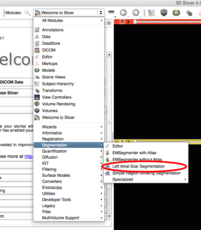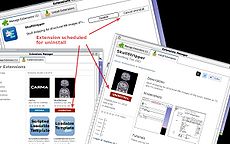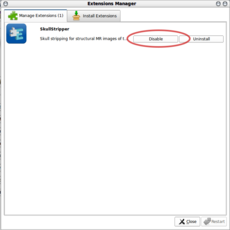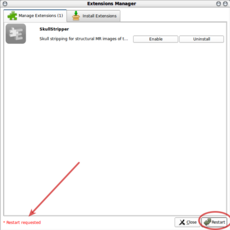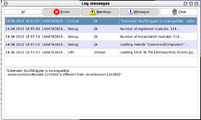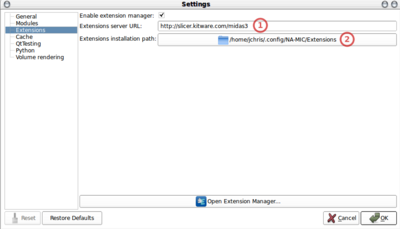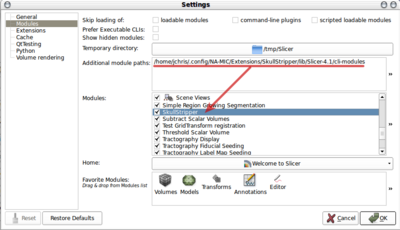Difference between revisions of "Documentation/4.3/SlicerApplication/ExtensionsManager"
(Nightly -> 4.3) |
|||
| Line 42: | Line 42: | ||
== Incompatible extensions == | == Incompatible extensions == | ||
| − | + | <!-- | |
'''Caveat''': Considering that installed extensions are common to all Slicer version installed by a given user and that an extension is specific to a given revision of Slicer, it's currently not possible to have working extension installed for multiple version of Slicer. The issues has been reported as #[http://www.na-mic.org/Bug/view.php?id=1958 1958] and is currently targeted for 4.2.0 release. | '''Caveat''': Considering that installed extensions are common to all Slicer version installed by a given user and that an extension is specific to a given revision of Slicer, it's currently not possible to have working extension installed for multiple version of Slicer. The issues has been reported as #[http://www.na-mic.org/Bug/view.php?id=1958 1958] and is currently targeted for 4.2.0 release. | ||
| + | --> | ||
<gallery widths=230px heights=120px perrow=4> | <gallery widths=230px heights=120px perrow=4> | ||
Latest revision as of 04:52, 24 July 2014
Home < Documentation < 4.3 < SlicerApplication < ExtensionsManager
|
For the latest Slicer documentation, visit the read-the-docs. |
3D Slicer now supports plug-ins which we call extensions. Extensions are available from an extension server. This allows end-users to select the extensions useful to them, without having to download the entire extension archive.
Extensions Manager
Prerequisites
ExtensionsManager must be enabled in the Application Settings (menu item "Edit -> Application Settings -> Extensions"). If you changed the setting, Slicer has to be restarted for it to become effective.
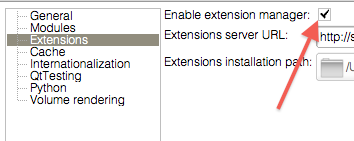
Installing an extension
Uninstalling an extension
Disabling an extension
Incompatible extensions
Extensions Manager Settings
|
|
|
Whereas the module path is used to indicate Slicer where to look to load additional modules, the extension manager also takes care of updating the |
User FAQ: Extensions
What is an extension ?
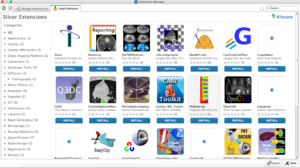
An extension could be seen as a delivery package bundling together one or more Slicer modules. After installing an extension, the associated modules will be presented to the user as built-in ones
The Slicer community maintains a website referred to as the Slicer Extensions Catalog to support finding, downloading and installing of extensions. Access to this website is integral to Slicer and facilitated by the Extensions Manager functionality built into the distributed program.
The Catalog classifies extensions into three levels of compliance:
- Category 1: Fully compliant Slicer Extensions: Slicer license, open source, maintained.
- Category 2: Open source, contact exists.
- Category 3: All other extensions (work in progress, beta, closed source etc).
To publish extensions, developers should consider reading the following pages:
What is the extensions catalog ?
The extensions catalog provides Slicer users with a convenient way to access the extensions previously uploaded on the extensions server:
- from within Slicer with the help of the extensions manager
- from the web: http://slicer.kitware.com/midas3/slicerappstore
Why there are no windows 32-bit extensions available ?
- Win 32 has a very limited amount of memory available to an application.
- Many registration and segmentation algorithms fail on that platform because they run out of memory, when used with state of large data.
- Some of these failures are just that, some can crash slicer. Even though the "real" failure is caused by overextending the capabilities of the hardware (in a way the users fault), it appears to the user that Slicer does not work.
- If you search the archives of slicer-users there are several such complaints until we started to discourage people to use 32 bit.
Discussion: http://massmail.spl.harvard.edu/public-archives/slicer-users/2013/006703.html
Should I install the nightly version to access to last extension updates ?
If the extension developers contributed updates for the current stable release, you don't have to install the nightly version of Slicer. You can simply update the extension. Consider reading How to update an already installed extension ?.
On the other hand, if the extension developers stopped to maintain the version of their extension built against the stable release (so that we can use the latest feature that will be in the next Slicer release), downloading the nightly is the only way to get the latest version of the extension.
How to update an already installed extension?
Assuming updates extensions are available for your version of Slicer, it is currently not possible without uninstalling the extension and re-installing it.
We are currently developing a mechanism allowing to either manually update or automatically suggest update. In the process of finalizing, reviewing and testing, the corresponding feature will be available in Slicer 4.12.
For more details, see [1][2] and [3]
[1] http://na-mic.org/Mantis/view.php?id=2089
[2] https://github.com/mwoehlke-kitware/Slicer/tree/REBASE-2089-update-extensions
[3] http://wiki.slicer.org/wiki/Documentation/Labs/ExtensionsFrameworkRoadmap
How to manually install an extension ?
1) Get revision associated with your install or built Slicer. (Menu -> Help -> About)
2) Download extension matching your Slicer revision. Select operating system, bitness and enter revision on http://slicer.kitware.com/midas3/slicerappstore
3) Extract the archive (zip or tar.gz) in a folder. You should then have a folder like:
/path/to/<slicer_revision>-<os>-<bitness>-<extension_name>-<extension_scm><extension_revision>-YYYY-MM-DD
containing folder like:
lib/Slicer-X.Y/cli-modules lib/Slicer-X.Y/qt-loadable-modules lib/Slicer-X.Y/qt-scripted-modules
For more details: Documentation/4.3/Developers/DirectoryStructure
4) In the Module settings (Menu -> Edit -> Settings), add the path ending with lib/Slicer-X.Y/{cli|qt-scripted|qt-loadable}-modules
